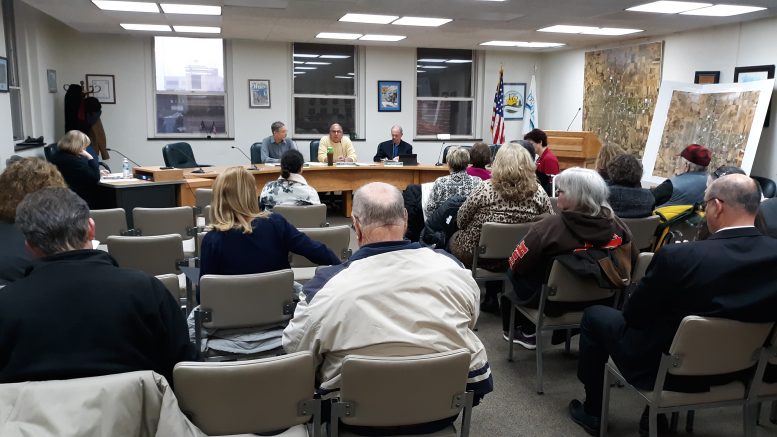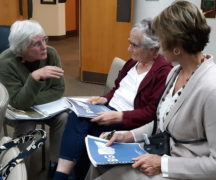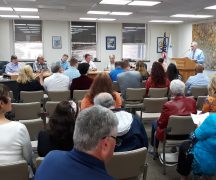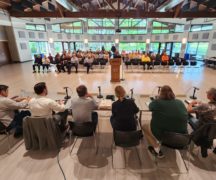By JAN LARSON McLAUGHLIN
BG Independent News
Rose Hess hears frequent complaints from BGSU students about their rental housing. As a member of the East Side Neighborhood Group, she hears their concerns about mold, bedrooms in damp basements with no windows, lights that flicker if the washer is running, drafty windows, and bedroom windows painted shut.
“They ask me why they have to provide smoke alarms,” for the houses they are renting, Hess said. “These are the things going on that we don’t know about.”
“You never will – unless you have some kind of internal inspections,” she said.
Hess was one of the speakers Tuesday evening at the second meeting held on potential rental housing inspections or registrations in Bowling Green. Listening were the three members of City Council’s Community Improvement Committee – John Zanfardino, Bill Herald and Neocles Leontis.
“This is a complex issue with a lot of stakeholders,” Zanfardino said of the housing rental dilemma.
The main concern for Hess is the number of former single family homes converted into uninspected rentals.
“Those are businesses,” she said. “But so far as I know, nobody inspects them to see if they are up to code.”
The Wood County Health Department surveys the exterior of Bowling Green homes every five years – but there are no mandatory interior inspections.
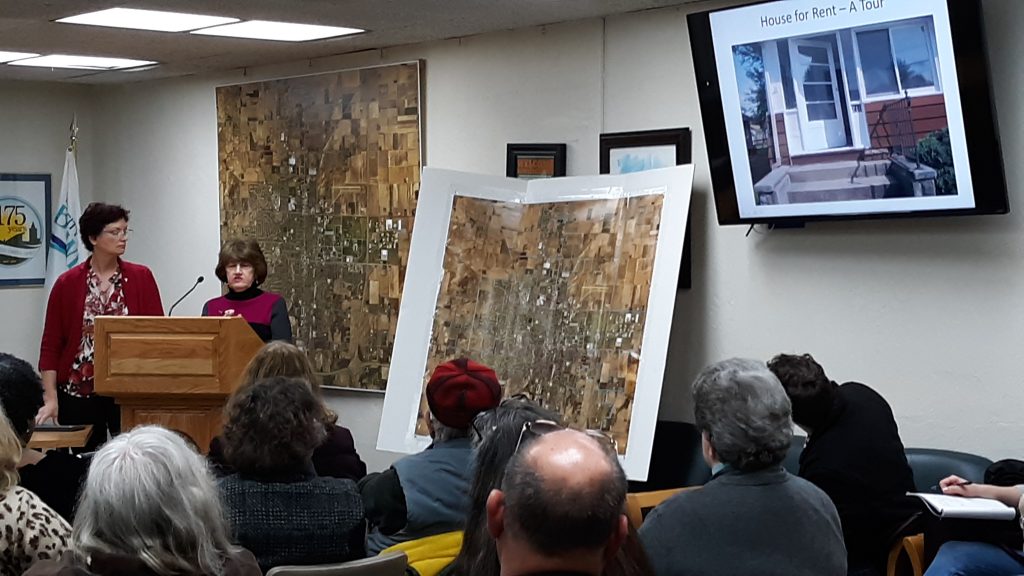
Lori Young, also a member of the East Side group, showed photos of the inside of a rental home leased out to BGSU students. The washer had a combination of “mold, slime, water” in it, the stove and oven did not work, the dryer in the basement had no venting, the electrical box had no door, windows were propped open with bricks, and the basement light switch could only be reached by walking four steps down in the dark.
“Most of them don’t complain to their landlords because they want to get their deposits back,” Young said.
In the case of this rental house, the Bowling Green Fire Division found 13 serious violations, including electrical hazards prone to fire and shock risks.
Hess still remembers the former fire chief’s reaction to the deficiencies in the rental.
“‘This house is not as bad as you think,’” she said, repeating his assessment. “‘Our men find far worse.’”
“This just blows me away,” Hess said. “This is why we’re concerned about the safety of housing.”
Hess acknowledged that not all landlords are a problem.
“We have some great landlords in this town,” she said, looking at some of the landlords at Tuesday’s meeting. But that doesn’t solve the problem of unfit housing, she added.
“I don’t know how many places are like this. You don’t either,” she said to the City Council committee.
It will take more than a voluntary self-inspection program to fix the problem, Hess said.
“We have a voluntary system right now. It’s not working,” she said.
Hess suggested looking at an inspection program that would allow landlords to skip future inspections if they pass the first. She also pointed out that all communities resist such inspection measures initially.
“There are so many different plans out there,” she said. “We just need to find one suitable for us.”
Leontis agreed. “We’re not breaking new ground here,” he said.
One renter spoke at the meeting, telling her experience as a BGSU faculty member who moved to an apartment complex in Bowling Green. Within the first month, she found roaches and ants, problems with the dishwasher and refrigerator, and a water problem in the shower. The problems have gone unresolved.
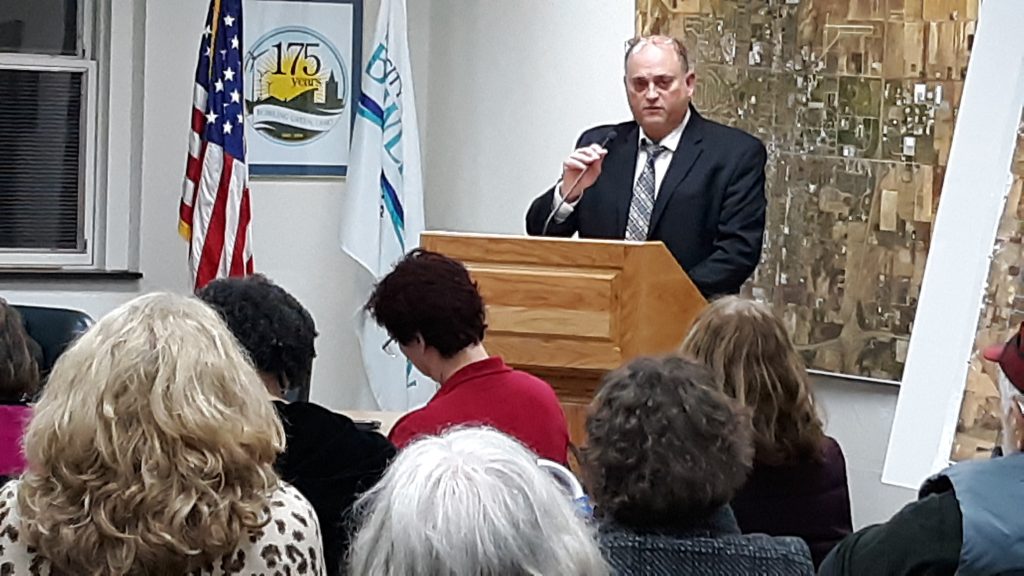
Rodney Fleming, an attorney with BGSU Student Legal Services, explained that the landlord-tenant market here is different because of the frequent turnover of renters. So “bad landlords” don’t get forced out of the market.
Of the student complaints filed with the legal services office, an average of 18% involve landlord-tenant issues, Fleming said. Last year, of the 1,132 students who sought services, 187 involved problems with landlords.
Fleming suspects there are far more since most students aren’t aware of their rights.
“They’re not sure where to turn when they have issues,” he said. “I fear that a lot of students don’t come to see us for fear of retaliation from landlords.”
Fleming recalled cases where renters had rodents in their units, and where renters had no working appliances even though landlords are required by law to provide those.
“I’ve seen leases in town that try to get around that,” he said.
Fleming asked the City Council committee members if they wanted to continue to let renters fend for themselves – or set some rules to make sure rentals are safe.
“In this community, the consumer is not very sophisticated,” he said. “The landlords are sophisticated. This is their business.”
Fire Chief Bill Moorman responded to questions from Leontis about rental safety inspections. The fire division conducts inspections of about 1,400 commercial, educational or health-related buildings annually as part of its “community risk reduction” program, the chief said.
“The safety of every citizen in Bowling Green is our primary focus,” Moorman said.
However, the fire division cannot inspect rental housing, unless the tenant files a complaint.
Moorman said many of the larger apartment complex owners already conduct inspections annually.
“They care about their tenants,” the chief said. And in many cases, the inspections are required by insurance.
Leontis asked if older homes converted into rental units are inspected by the fire division. Moorman said no, but added that if major renovations are made to a house, the county building inspection office must approve the work.
“Are there some rentals that haven’t had those? I’d have to say yes,” the chief said.
But he explained that old electrical wiring, like knob and tube wiring, are not necessarily violations. The wiring may look unsafe to the average person, but “as long as they’re intact, they are still allowed,” he said.
One landlord also spoke at the meeting. Steve Green, owner of Mecca Management and some apartments, said he’s aware there are some problems with rental housing in Bowling Green.
“It brings us all down,” he said. “We wouldn’t be here if every landlord took care of their properties.”
But Green said a mandatory inspection or registration program is not the answer.
“If you’re going to stop speeding on Wooster Street, you don’t stop every car,” he said.
Green said the housing stock in Bowling Green is far better than in many cities.
“Most landlords are local people who take pride in their properties,” he said. “We want to cooperate with the city, with neighbors.”
Any program that involves mandatory fees will result in higher costs for renters, Green added.
“Making more laws and creating more fees is not going to help with affordable housing,” he said. “Who pays for it – the people in our community who can least afford it.”
Green suggested that a better step would be putting more teeth in existing laws, by issuing penalties against landlords known to be in violation.
Zanfardino said the council committee has plans to send out questionnaires to local landlords, asking for their suggestions of a good remedy to the issue.
The next meeting on the rental housing issue will be held Feb. 18, at 6 p.m., in City Council chambers.

